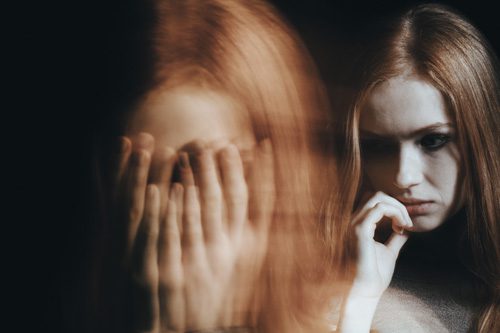 If someone suffers from depression and a drug or alcohol addiction, this is referred to as a dual diagnosis.
If someone suffers from depression and a drug or alcohol addiction, this is referred to as a dual diagnosis.
Understanding the relationship between these two co-occurring disorders can help you decide how to best support your loved one.
Signs of Depression
It’s estimated that about one in three adults with a substance use disorder also suffer from clinical depression. If you’ve noticed signs of substance abuse in a loved one, it’s important to consider if they may also be struggling with depression.
Depression is a mood disorder that occurs when neurotransmitters in the brain are out of balance. It is normal to feel sad and disinterested in your surroundings occasionally, but someone with depression experiences episodes of extreme low mood that interfere with their daily activities.
Common signs that a loved one may be suffering from depression include:
- Appetite changes: People with depression often find themselves turning to fast food, sweets, or other comfort food that causes weight gain. Or, they may find themselves uninterested in food all together.
- Sleep changes: Depression can cause trouble sleeping, leading to fatigue during the day. Alternatively, the condition can make people want to sleep all the time.
- Lack of interest in hobbies or socializing: It is common for people with depression to be uninterested in the hobbies they previously enjoyed. They may also be less interested in spending time with their friends and family.
- Trouble concentrating and making decisions: Someone with depression may struggle to focus well enough to complete tasks at work or school.
- Expressing feelings of worthlessness or helplessness: Individuals with depression often describe themselves as unworthy of love or powerless to change their lives for the better.
- Talk of death or self-harm: Not all individuals with depression express direct thoughts of self-harm, but this symptom indicates an immediate need for medical attention.
Mayo Clinic outlines the symptoms of depression in greater detail.
Substance Abuse as a Way to Self-Medicate Depression
For someone who struggles with depression, abusing drugs or alcohol may be an attempt to self-medicate the symptoms of their condition. For example, someone who struggles to fall asleep at night might drink alcohol as part of a nightly bedtime routine. Someone who has trouble concentrating and focusing might abuse amphetamines to improve their performance at school or work.
Stigma plays a significant role in self-medicating depression. Someone who believes that mental health issues are shameful or a sign of a character defect is unlikely to seek help from a medical professional or share their struggles with the people around them. They will seek out whatever fix they can find to bring relief without compromising their privacy.
Self-medicating depression with drugs or alcohol can work as a short-term solution. However, this behavior is dangerous because a tolerance to the abused substance quickly develops. This leads to increased dosages to achieve the same effect. It can also cause an individual to begin mixing two or more addictive substances together in search of relief, which can create the risk of dangerous and potentially deadly side effects.
How Substance Abuse Can Lead to a Mental Health Disorder
Although self-medicating existing depression is more common, substance abuse can also create depression symptoms in people who previously did not suffer from the condition. This is because prolonged substance abuse causes changes in the brain which make it more difficult for the neurotransmitters to properly regulate mood.
Someone under the influence of drugs or alcohol has impaired judgment and problem-solving skills. This can make it hard to accurately assess a situation and cause small obstacles to seem like overwhelming challenges.
Substance abuse can also lead to depression by causing life changes that make a person more vulnerable to the condition. For example:
- Not eating or sleeping properly due to substance abuse
- Neglecting stress-relieving hobbies in favor of substance abuse
- Straining relationships with family and friends, which creates reduced sources of emotional support
- Experiencing a job loss or financial problems
Getting Help
Regardless of whether depression or addiction came first, both conditions are treatable. They can’t be cured in the same way you’d take antibiotics to cure a bacterial infection, but they can be managed in a way that allows the individual to live a full and productive life.
For individuals who suffer from co-occurring depression and addiction, it’s vital to seek treatment that addresses both disorders. Treating depression without addressing substance abuse doesn’t fix the problems caused by drug or alcohol addiction that can lead to increased depression symptoms. Treating substance abuse without stabilizing depression increases the risk of relapse due to an urge to self-medicate depression symptoms.
Mountain Laurel Recovery Center offers a full continuum of care for individuals struggling with depression and drug or alcohol addiction. Treatment includes detox services as well as intensive counseling designed to uncover the roots of depression and develop the coping skills necessary for a sober future. Depending on individual needs, medication may be recommended as well.

 If someone suffers from depression and a drug or alcohol addiction, this is referred to as a dual diagnosis.
If someone suffers from depression and a drug or alcohol addiction, this is referred to as a dual diagnosis.